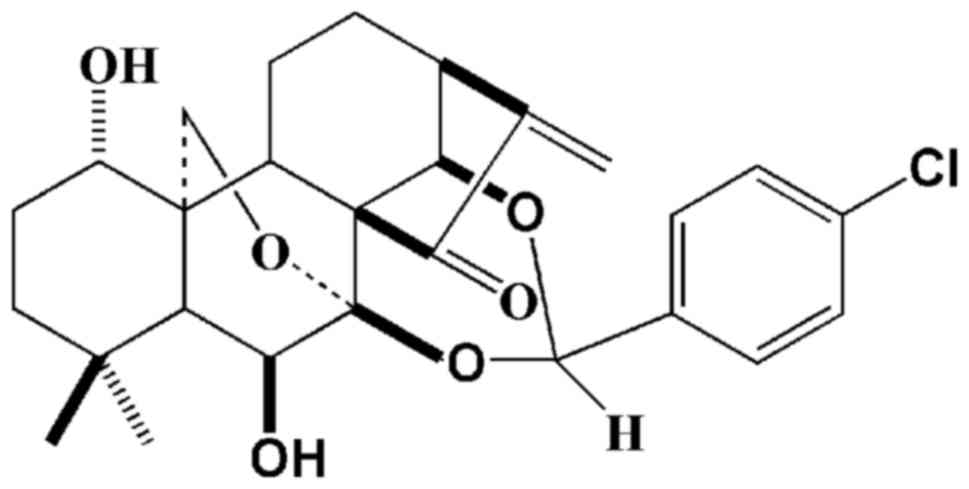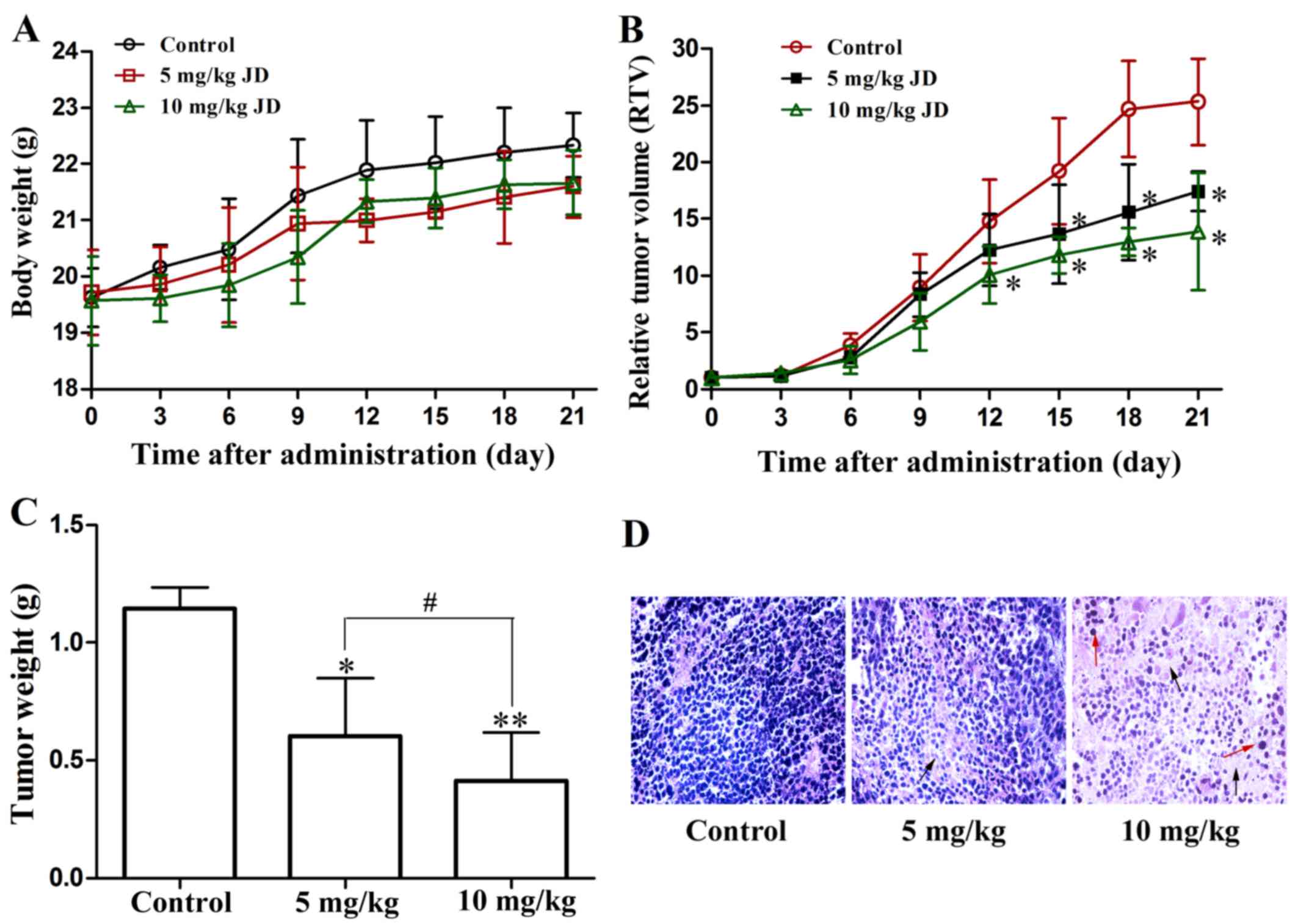|
1
|
Sui X, Chen R, Wang Z, Huang Z, Kong N,
Zhang M, Han W, Lou F, Yang J, Zhang Q, et al: Autophagy and
chemotherapy resistance: a promising therapeutic target for cancer
treatment. Cell Death Dis. 4:e8382013. View Article : Google Scholar : PubMed/NCBI
|
|
2
|
Lu HP and Chao CC: Cancer cells acquire
resistance to anticancer drugs: an update. Biomed J. 35:464–472.
2012. View Article : Google Scholar
|
|
3
|
Ambudkar SV, Dey S, Hrycyna CA,
Ramachandra M, Pastan I and Gottesman MM: Biochemical, cellular,
and pharmacological aspects of the multidrug transporter. Annu Rev
Pharmacol Toxicol. 39:361–398. 1999. View Article : Google Scholar : PubMed/NCBI
|
|
4
|
Baguley BC: Multidrug resistance in
cancer. Methods Mol Biol. 596:1–14. 2010. View Article : Google Scholar
|
|
5
|
Zhou Q, Li Y, Jin J, Lang L, Zhu Z, Fang W
and Chen X: Lx2-32c, a novel taxane derivative, exerts
anti-resistance activity by initiating intrinsic apoptosis pathway
in vitro and inhibits the growth of resistant tumor in vivo. Biol
Pharm Bull. 35:2170–2179. 2012. View Article : Google Scholar : PubMed/NCBI
|
|
6
|
Mor G, Montagna MK and Alvero AB:
Modulation of apoptosis to reverse chemoresistance. Methods Mol
Biol. 414:1–12. 2008.PubMed/NCBI
|
|
7
|
Hsu PC, Hung HC, Liao YF, Liu CC, Tsay GJ
and Liu GY: Ornithine decarboxylase attenuates leukemic
chemotherapy drugs-induced cell apoptosis and arrest in human
promyelocytic HL-60 cells. Leuk Res. 32:1530–1540. 2008. View Article : Google Scholar : PubMed/NCBI
|
|
8
|
Wang C, Guo LB, Ma JY, Li YM and Liu HM:
Establishment and characterization of a paclitaxel resistant human
esophageal carcinoma cell line. Int J Oncol. 43:1607–1617.
2013.PubMed/NCBI
|
|
9
|
Liu Z, Ouyang L, Peng H and Zhang WZ:
Oridonin: Targeting programmed cell death pathways as an
anti-tumour agent. Cell Prolif. 45:499–507. 2012. View Article : Google Scholar : PubMed/NCBI
|
|
10
|
Li CY, Wang EQ, Cheng Y and Bao JK:
Oridonin: An active diterpenoid targeting cell cycle arrest,
apoptotic and autophagic pathways for cancer therapeutics. Int J
Biochem Cell Biol. 43:701–704. 2011. View Article : Google Scholar : PubMed/NCBI
|
|
11
|
Wang C, Jiang L, Wang S, Shi H, Wang J,
Wang R, Li Y, Dou Y, Liu Y, Hou G, et al: The antitumor activity of
the novel compound Jesridonin on human esophageal carcinoma cells.
PLoS One. 10:e01302842015. View Article : Google Scholar : PubMed/NCBI
|
|
12
|
Tian QE, Li HD, Yan M, Cai HL, Tan QY and
Zhang WY: Astragalus polysaccharides can regulate cytokine and
P-glycoprotein expression in H22 tumor-bearing mice. World J
Gastroenterol. 18:7079–7086. 2012. View Article : Google Scholar
|
|
13
|
Wacheck V and Zangemeister-Wittke U:
Antisense molecules for targeted cancer therapy. Crit Rev Oncol
Hematol. 59:65–73. 2006. View Article : Google Scholar : PubMed/NCBI
|
|
14
|
Uchiyama-Kokubu N and Watanabe T:
Establishment and characterization of adriamycin-resistant human
colorectal adenocarcinoma HCT-15 cell lines with multidrug
resistance. Anticancer Drugs. 12:769–779. 2001. View Article : Google Scholar : PubMed/NCBI
|
|
15
|
Fulda S and Debatin KM: Extrinsic versus
intrinsic apoptosis pathways in anticancer chemotherapy. Oncogene.
25:4798–4811. 2006. View Article : Google Scholar : PubMed/NCBI
|
|
16
|
Zhang J, Zhu X, Li H, Li B, Sun L, Xie T,
Zhu T, Zhou H and Ye Z: Piperine inhibits proliferation of human
osteosarcoma cells via G2/M phase arrest and metastasis by
suppressing MMP-2/-9 expression. Int Immunopharmacol. 24:50–58.
2015. View Article : Google Scholar
|
|
17
|
Hafezi F, Steinbach JP, Marti A, Munz K,
Wang ZQ, Wagner EF, Aguzzi A and Remé CE: The absence of c-fos
prevents light-induced apoptotic cell death of photoreceptors in
retinal degeneration in vivo. Nat Med. 3:346–349. 1997. View Article : Google Scholar : PubMed/NCBI
|
|
18
|
Cao B, Chen H, Gao Y, Niu C, Zhang Y and
Li L: CIP-36, a novel topoisomerase II-targeting agent, induces the
apoptosis of multidrug-resistant cancer cells in vitro. Int J Mol
Med. 35:771–776. 2015.PubMed/NCBI
|
|
19
|
Uboldi S, Bernasconi S, Romano M, Marchini
S, Fuso Nerini I, Damia G, Ganzinelli M, Marangon E, Sala F, Clivio
L, et al: Characterization of a new trabectedin-resistant myxoid
liposarcoma cell line that shows collateral sensitivity to
methylating agents. Int J Cancer. 131:59–69. 2012. View Article : Google Scholar
|
|
20
|
Bai HW, Badaboina S, Park CH, Choi BY, Na
YH and Chung BY: Centipedegrass extract induces apoptosis through
the activation of caspases and the downregulation of I3K/Akt and
MAPK phosphorylation in leukemia cells. Int J Mol Med. 35:511–518.
2015.
|
|
21
|
Kroemer G and Reed JC: Mitochondrial
control of cell death. Nat Med. 6:513–519. 2000. View Article : Google Scholar : PubMed/NCBI
|
|
22
|
Fares M, Abedi-Valugerdi M, Hassan M and
Potácová Z: DNA damage, lysosomal degradation and Bcl-xL
deamidation in doxycycline- and minocycline-induced cell death in
the K562 leukemic cell line. Biochem Biophys Res Commun.
463:268–274. 2015. View Article : Google Scholar : PubMed/NCBI
|
|
23
|
Peng J, Ding J, Tan C, Baggenstoss B,
Zhang Z, Lapolla SM and Lin J: Oligomerization of membrane-bound
Bcl-2 is involved in its pore formation induced by tBid. Apoptosis.
14:1145–1153. 2009. View Article : Google Scholar : PubMed/NCBI
|
|
24
|
Kluck RM, Bossy-Wetzel E, Green DR and
Newmeyer DD: The release of cytochrome c from mitochondria: A
primary site for Bcl-2 regulation of apoptosis. Science.
275:1132–1136. 1997. View Article : Google Scholar : PubMed/NCBI
|
|
25
|
Degli Esposti M and Dive C: Mitochondrial
membrane permeabilisation by Bax/Bak. Biochem Biophys Res Commun.
304:455–461. 2003. View Article : Google Scholar : PubMed/NCBI
|
|
26
|
Chipuk JE, Kuwana T, Bouchier-Hayes L,
Droin NM, Newmeyer DD, Schuler M and Green DR: Direct activation of
Bax by 53 mediates mitochondrial membrane permeabilization and
apoptosis. Science. 303:1010–1014. 2004. View Article : Google Scholar : PubMed/NCBI
|
|
27
|
Kang MH and Reynolds CP: Bcl-2 inhibitors:
Targeting mitochondrial apoptotic pathways in cancer therapy. Clin
Cancer Res. 15:1126–1132. 2009. View Article : Google Scholar : PubMed/NCBI
|
|
28
|
Bodur C and Basaga H: Bcl-2 inhibitors:
Emerging drugs in cancer therapy. Curr Med Chem. 19:1804–1820.
2012. View Article : Google Scholar : PubMed/NCBI
|
|
29
|
Nikoletopoulou V, Markaki M, Palikaras K
and Tavernarakis N: Crosstalk between apoptosis, necrosis and
autophagy. Biochim Biophys Acta. 1833:3448–3459. 2013. View Article : Google Scholar : PubMed/NCBI
|
|
30
|
Seervi M, Sobhan PK, Joseph J, Ann Mathew
K and Santhoshkumar TR: ERO1α-dependent endoplasmic
reticulum-mitochondrial calcium flux contributes to ER stress and
mitochondrial permeabilization by procaspase-activating compound-1
(PAC-1). Cell Death Dis. 4:e9682013. View Article : Google Scholar
|
|
31
|
Culmsee C and Mattson MP: 53 in neuronal
apoptosis. Biochem Biophys Res Commun. 331:761–777. 2005.
View Article : Google Scholar : PubMed/NCBI
|
|
32
|
Tacar O and Dass CR: Doxorubicin-induced
death in tumour cells and cardiomyocytes: Is autophagy the key to
improving future clinical outcomes? J Pharm Pharmacol.
65:1577–1589. 2013. View Article : Google Scholar : PubMed/NCBI
|
|
33
|
West KA, Castillo SS and Dennis PA:
Activation of the I3K/Akt pathway and chemotherapeutic resistance.
Drug Resist Updat. 5:234–248. 2002. View Article : Google Scholar
|




















